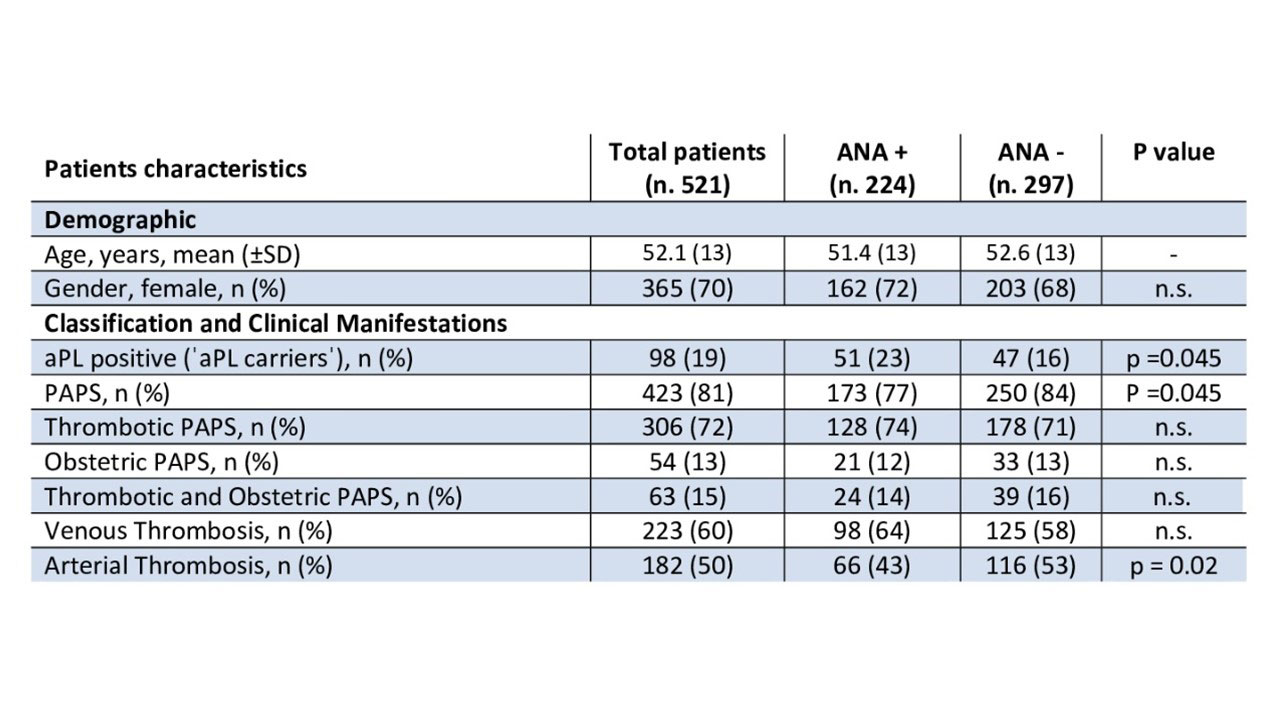Session Information
Session Type: Poster Session B
Session Time: 9:00AM-10:30AM
Background/Purpose: APS ACTION is an international Clinical Database and Repository of persistently antiphospholipid antibody (aPL)-positive subjects, collecting demographic, medical history, and aPL data.This study focused on the prevalence of antinuclear antibodies (ANA) in aPL positive patients without a defined concomitant autoimmune disease. The objective of this study was to evaluate potential differences when stratifying patients by ANA, and to better phenotype aPL positive patients.
Methods: Data from aPL positive patients with or without APS classification criteria were retrieved from the APS ACTION Database. Patients with a diagnosis of systemic lupus erythematosus (SLE) or other connective tissue disease were excluded. Patients were divided in two groups (ANA+ and ANA-), based on ANA status at registry entry. Subsequently, demographic, clinical (including 1997 ACR SLE classification criteria), and serological data were compared between the two subgroups.
Results: 521 aPL-positive patients were included in the study (meanage 52.1±13 years, 70% female). Among them, 224 patients were ANA+ and 297 ANA-. Patients characteristics are displayed in Table 1. ANA positivity was significantly associated with previous history of hematological manifestations as a whole, including hemolytic anemia, thrombocytopenia, and leukopenia, (19.3% ANA+ vs. 8.4% ANA-, p < 0.01) and livedo reticularis (15.1% ANA+ vs. 10% ANA-, p < 0.05). A positive association with the number of unexplained fetal deaths beyond 10 weeks of gestation was also noted (p < 0.05), and a trend was observed for lower platelet count, aPL-related nephropathy and arthritis, though these associations were not statistically significant. No significant association was found for extra-criteria manifestations such as haemolytic anemia and history of thrombocytopenia, when considered individually. When sub-analysing the ANA- group, a significant association with any history of arterial thromboses (29.4% ANA+ vs. 38.8% ANA-, p < 0.02) and the number of arterial events was observed (p < 0.01). When evaluating ANA positivity in aPL carriers and primary APS (PAPS) individually, the association between ANA+ and previous hematologic disorder remained significant for both groups, with stronger significance for PAPS patients. In addition, ANA positivity in PAPS patients was significantly associated with livedo reticularis and previous history of small vessel disease (p < 0.05).
Conclusion: In this large international cohort, ANA positivity was associated with a higher rate of hematologic manifestations in aPL-positive patients without connective tissue disease. ANA+ patients, especially those with PAPS, showed a tendency toward a higher rate of microvascular manifestations and arthritis. ANA- subjects showed a significantly higher rate of arterial thrombosis, without any other significant association with clinical, serological or demographic data.
To cite this abstract in AMA style:
Cecchi I, Radin M, Foddai S, Bertolaccini M, De Andrade D, Tektonidou M, Pengo V, Ruiz-Irastorza G, Belmont H, Gerosa M, Fortin P, Lopez-Pedrera C, Zhang Z, Atsumi T, de Jesus G, Cohen H, Kello N, Branch W, Wahl D, Andreoli L, Rodriguez E, Petri M, Barber M, Cervera R, Knight J, Artim-Esen B, Willis R, Pons-Estel G, Erkan D, Sciascia S. ANA-positive versus ANA-negative Antiphospholipid Antibody-positive Patients Without Other Systemic Autoimmune Diseases: Clinical and Serological Characteristics, Results from the APS ACTION Clinical Database and Repository [abstract]. Arthritis Rheumatol. 2022; 74 (suppl 9). https://acrabstracts.org/abstract/ana-positive-versus-ana-negative-antiphospholipid-antibody-positive-patients-without-other-systemic-autoimmune-diseases-clinical-and-serological-characteristics-results-from-the-aps-action-clinical/. Accessed .« Back to ACR Convergence 2022
ACR Meeting Abstracts - https://acrabstracts.org/abstract/ana-positive-versus-ana-negative-antiphospholipid-antibody-positive-patients-without-other-systemic-autoimmune-diseases-clinical-and-serological-characteristics-results-from-the-aps-action-clinical/

